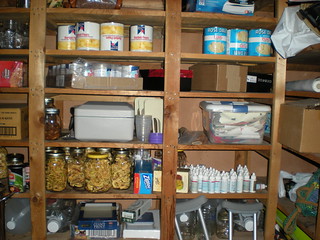This topic's been on my back burner for a while but I thought I'd move it to the front after the recent hurricane Sandy. Over the past few years I've set up and maintained a small stockpile of food and water and learned a lot in the process.
 I started hearing talk of prepping for mankind's
"end of days" ever since the Y2K changeover. Whether it was Y2K, the Avian Flu,
the end of the Mayan calendar or the Zombie Apocalypse there's never a shortage
of catastrophic events that will surely end modern human civilization. If you're
like me you probably don't believe in the Zombie Apocalypse. But there are some
practical advantages to planning for the real life emergencies we've all encountered
at some point.
I started hearing talk of prepping for mankind's
"end of days" ever since the Y2K changeover. Whether it was Y2K, the Avian Flu,
the end of the Mayan calendar or the Zombie Apocalypse there's never a shortage
of catastrophic events that will surely end modern human civilization. If you're
like me you probably don't believe in the Zombie Apocalypse. But there are some
practical advantages to planning for the real life emergencies we've all encountered
at some point.
Within the last few years I've experienced both unemployment and power outage from a snow storm. The loss of power for a week was an eye opener for me. Things could have gotten ugly had the grocery stores or a larger area been without power for long. Luckily, everyone was civil and friendly. Society did not break down. Quite the opposite: I even got to meet a few of my neighbors for the first time as we all pulled together to help each other out. But the experience really motivated me to keep an extra stockpile of food at the house. I've since learned a lot over the last couple years and picked up a few strategies.
Advantages of Stocking Up
- Saves money
- Saves time
- Reduces stress
- Healthier food
- Potential lifesaver in an emergency
 It's not all puppy dogs and sunshine. There
are some downsides to starting and maintaining a food stockpile. Although the advantages
far outweigh the disadvantages.
It's not all puppy dogs and sunshine. There
are some downsides to starting and maintaining a food stockpile. Although the advantages
far outweigh the disadvantages.
Disadvantages
- Expensive to set up
- Change in mindset
- Space requirements
- Upkeep and maintenance
Advantages
Saves Money
There are some real advantages to what our household affectionately calls "the grocery store." Over time it does save money since I can stock up when items are on sale and then pull from "the store" when they're not. And I can really take advantage of season shifts in prices; things like frozen fruit.
Saves Time
Keeping a well stocked store saves time as well. I try and cook frequently and don't have to worry about running to the store should I run out of something. Instead it's just a quick trip downstairs for that extra can of Cream of Mushroom. If I do have to run to the store for a recipe it's usually for one or two perishable ingredients vs the entire meal.
Reduces Stress
 Keeping the store has reduced my stress in
many ways. I don't feel I have to make the frantic rush to the grocery store each
week. I don't sweat it if I miss making it to the grocery by a few days or even
a week. More importantly it really took some weight off my shoulders being unemployed
with mouths to feed at home. Fortunately, I was never out of work for long, but
being in IT I know my position is generally expendable. When there is an alert for
bad weather everyone else is racing to the grocery while we're calm, cool and collected
at home. Knowing my family won't starve in emergencies is a huge stress reliever.
Keeping the store has reduced my stress in
many ways. I don't feel I have to make the frantic rush to the grocery store each
week. I don't sweat it if I miss making it to the grocery by a few days or even
a week. More importantly it really took some weight off my shoulders being unemployed
with mouths to feed at home. Fortunately, I was never out of work for long, but
being in IT I know my position is generally expendable. When there is an alert for
bad weather everyone else is racing to the grocery while we're calm, cool and collected
at home. Knowing my family won't starve in emergencies is a huge stress reliever.
Healthier Food
Keeping everything well stocked means I can pick healthier options in advance. It may not always be fresh, but often times frozen is better anyway. I also enjoy cooking and try to do so a couple times a week. I also cook more than we need and sock away leftovers in the freezer. If I'm not freezing healthy meals then I'm freezing prepped ingredients like homemade chicken stock for later use. Now we always have extra, healthy meals on hand vs having to stop for fast food.
Emergency Preparedness
Protecting against emergencies and natural disasters is the real advantage of keeping a well-stocked grocery. I've heard that most grocery stores only keep 2-3 days worth of food on the shelves. Having my own grocery store that could feed my family for weeks could be a lifesaver in a real emergency. Having experienced some rough snow storms it's realistic to think we could experience a break in the food supply.
Disadvantages
Expensive to Set Up
This is one that hurts and can be a real roadblock to some. First, there's the expense of physical storage. In our case some new shelves, an upright freezer and food-safe containers. Not a huge deal, but it should be factored into the cost.
Second is the purchasing of the groceries themselves. You could go all in and buy a few months supply of all your non-perishable groceries at once. However, I opted to slowly buy a few extra items every week over the course of months. This spread out the cost a bit and kept it relevant to the things I really do buy on a regular basis. Each week I'd pick 4 or 5 non-perishable items on our list and buy a few extras. It kept the sticker shock low despite the increase in our food budget over the first few months.
Change in Mindset
Building up and maintaining a home food store vs weekly trips to the grocery was a real shift in how I thought about our food. I used to take a quick glance of what was obviously missing and coupled that with what I thought I might need that week. It worked well enough from week to week. Switching to the home grocery store model meant I'm always thinking of what is going to expire and what can I stock up on when it's on sale. Plus, we have to remember to pull from the home grocery when we run out of things vs immediately buying from the store. I had to think about groceries and food a lot more than I used to. After a small learning curve it's second nature.
Space Requirements
A couple months of food and water isn't a small thing. It physically takes up space. Luckily, we have the room to spare but it should be taken into consideration. You'll be surprised at what space you can recover with a little re-organizing.
Upkeep and Maintenance
Aside from the change in mindset I've had to change some strategies for shopping. I'm much more aware of seasonal shifts in prices. Plum jam isn't available year round for us. Yet I use it frequently enough to notice. I'm always on the lookout for bulk deals that I wouldn't normally take. For example, our local grocery store frequently offers 11 items for $10. I would have never purchased 11 packages of mushrooms. Now I take them home and cook them with onions and freeze in smaller portions.
Then there's the wasted money if items expire. I'm regularly checking expiration dates and making sure things are organized and in good shape. Unfortunately, I'm often rearranging items based on volume. Maintaining the home store is yet another project around the house.
Don't forget the FIFO method: First In, First Out. Newer items are stocked in the back and the oldest items in front.
My Setup
First off, I only buy and stockpile things we eat and drink. MRE's may last years but there's no point if I end up throwing them away. If we do have a true Zombie Apocalypse then I have far larger problems to deal with when my stockpile of food is gone.
Kitchen Pantry
I keep a row of grocery items in the back of our pantry. Fortunately, our pantry is deep enough to pull this off. Keeping long-term storage in back has a couple advantages. One, it keeps all the opened items in the front. In the past, any open items that made their way to the back were lost and eventually thrown away after they had gone stale.
I also keep items in the back of our pantry since our basement can get damp after a good rain. Items like dry pasta, which don't react well to water, are kept upstairs and dry in the back of the pantry.
Upright Freezer
A great investment is the upright freezer. They're a little pricier than the chest freezers but if you keep an eye out you can find a deal on a scratch and dent model. Plus they have a few distinct advantages over the chest freezers. Mainly, I don't have to take everything out to get to the bottom of the freezer. It's easier to keep a variety of items on hand since everything's accessible.
I keep like items in baskets in the freezer. These act as drawers that I can easily pull out, grab what I need and slide back in.
I also fill empty places with small, partially empty, bottles of water. They can easily be removed if I need the room. The freezer's more energy efficient if it's packed. In the event of losing power the frozen water will help keep the food cold.
Types of things I keep stocked in the freezer:
- Pork, beef, chicken, fish and shellfish. (Depending on what's on sale and nothing pre-seasoned).
- Frozen fruits and veggies. Nothing seasoned or in juices with extra sugar added.
- Nuts. Most whole nuts freeze well.
- Butter. Sticks of butter, great for cooking.
- Ice cream treats. It's generally cheaper and easier to buy vanilla ice cream and keep a few toppings on hand. The kids think it's something special to have a sundae bar instead of choices of flavors. I also keep low-cal and low-sugar treats on hand for guests with special dietary needs.
- Other pre-made appetizers. I always keep a box of cheese sticks or the like as an infrequent treat or handy for last minute entertaining. Definitely not a regular part of our diet.
- Jars of leftovers. I've never "canned" anything in my life but I use canning jars to freeze leftovers. Dishwasher safe, I can write on the lid with a dry erase marker and the girls have a serving or two of something healthy in a pinch. Not to mention cooked ingredients ready to go at a moments notice. Remember my bit about cooking mushrooms and onions?
Grocery Shelves
I have several sets of shelves in the basement containing food, water and toiletries. I keep the toiletries and cleaning supplies separate from the food. In the event anything should leak I don't want to contaminate our food. Because the toiletries can be smaller and oddly shaped we keep some in plastic bins with lids. One each for dental, travel and beauty.
Non-edible items include:
- Toothpaste, mouthwash, etc
- Shampoos and conditioners
- General cleaning products
- Paper products (paper towels, tissues, etc)
- Light bulbs
- Extra First Aid items
The food I keep on shelves separate from the non-edible items. Such as:
- Water, soda, beer, wine, etc
- Canned beans, soups and fruits
- Bottled products such as soy sauce, oils and ketchup
- Boxed dry goods like pudding, onion soup mix and cereal
- Extra bags of snacks and crackers (perfect for unexpected visitors)
- Plenty of dry rice and beans (of course)
I know. I know. I know: Canned anything is bad for you. Packed full of chemicals, salt and death. Yes, for the most part I agree and try to use fresh ingredients when possible. I cook from scratch when I can and avoid the fozen dinners at all costs. But I live in the real world and sometimes canned goods are a more cost effective option than eating out. For me canned goods are the only option for some ingredients. Plus, I'm the only cook in the house. If I'm busy the girls still need to be able to feed themselves. Canned pears are better than no pears any day. There are worse things than frozen veggies or a can of soup over homemade mashed potatoes.
Preparing for the Zombie Apocalypse has give me peace of mind for the future not to mention making my life easier on a daily basis.
The Road Ahead
I'm off to a good start but still have work to do. I've started reading up on canning foods at home since my freezer space is getting limited (even with the large freezer). I'm hoping to start canning my own food soon.
I'm slowly investing in larger water containers instead of the single gallon jugs
from the grocery. The
Aqua-Tainers
are space efficient, stack well and can be carried out in an emergency.
I also plan to start stocking up on freeze dried foods. We like to camp so I'll be able to rotate out the stock. If you don't have a need to use them outside of prepping then I wouldn't recommend them. The cost alone is prohibitive let alone the subjective taste and quality.
This article only focused on preparing for food and water. I'll cover electricity, communication, clothing and shelter in another article.
What storage and prep strategies work for you?